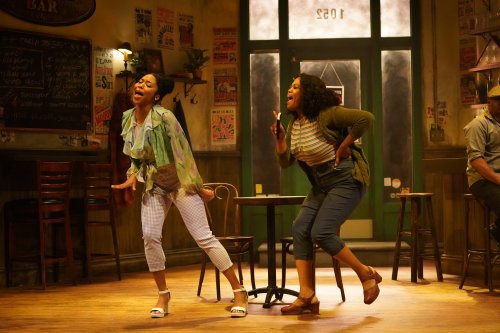This Land Was Made
A world premiere play at the Vineyard Theatre brings the past to life, though not indisputably.

Yasha Jackson, Leland Fowler, Antoinette Crowe-Legacy, Matthew Griffin, Ezra Knight and Libya V. Pugh in a scene from Tori Sampson’s “This Land Was Made” at the Vineyard Theatre (Photo credit: Carol Rosegg)
Roughly two years after he co-founded the Black Panther Party in October 1966, Huey P. Newton was found guilty of voluntary manslaughter for killing an Oakland police officer. The California Courts of Appeal eventually overturned the conviction, a decision that resulted in two new trials, two hung juries, and, finally, a dismissal of the case against Newton. As for what really happened on the night Officer John Frey pulled over Newton’s car, playwright Tori Sampson has a tale to share, one informed by history but not necessarily beholden to it.
Unlike other writers (looking at you, Mr. Shakespeare, whomever you are), Sampson is upfront about her dramatically freewheeling approach to the past in This Land Was Made, a memory play told from the perspective of its aptly-named narrator Sassy (Antoinette Crowe-Legacy) whose initial appearance in a gold lamé evening gown immediately suggests a taste and a talent for embellishment. Proudly adopting West African oral tradition, Sassy declares herself a “time-traveling griot” with a narrative authority that comes from being a youthful witness to some of the long-ago events she’s describing. But Sassy also admits to using less-than-clearly-remembered sources from “the grapevine” to fill in any missing personal observations. What the actual ratio between fact and conjecture in her words might be, Sassy never acknowledges. She just leaves us with a winking warning not to make stuff up when repeating what she’s said.

Julian Elijah Martinez and Matthew Griffin in a scene from Tori Sampson’s “This Land Was Made” at the Vineyard Theatre (Photo credit: Carol Rosegg)
Guided by her own historiographical terms, Sassy spellbindingly delivers a sweeping portrayal of Black life in Oakland towards the end of the Civil Rights Movement, when militant revolutionaries like the Black Panthers had fallen out of step with nonviolent protest. Leaving aside Sassy’s more imaginative speculations about Newton, it’s a persuasive recreation of a period and place when everything simultaneously seemed to be coming together and breaking apart. As so often is the case, a sense of which was happening tended to divide along generational lines, with the young venting radical hopes that their elders either couldn’t comprehend or feared might undermine the fragile peace they had made with their disappointments.
Pulling her recollection of the past into the present, Sassy invites us through the doors of Ms. Trish’s Bar, a blue-collar watering hole that, in a program note, Sampson compares to the one from Cheers. Sassy’s mother is the eponymous proprietor who, unlike the owner of that boob-tube pub, also serves a great bowl of shrimp and grits, which can be prepared while Sassy cuts your hair. Despite losing her son in Vietnam–a burial flag and military portrait are visible above the bar–Ms. Trish (Libya V. Pugh) has no desire to battle the unequal society for which he died; she’s willing to just “stay outta white folks way.” As for her close-in-age regular Mr. Far (Ezra Knight), he expresses support for Muhammad Ali’s refusal to be drafted into the U.S. armed forces but can’t sympathize with “riding buses, sitting at lunch counters, talking bout what the world owes you.”

Libya V. Pugh, Julian Elijah Martinez, Leland Fowler and Ezra Knight in a scene from Tori Sampson’s “This Land Was Made” at the Vineyard Theatre (Photo credit: Carol Rosegg)
Sampson juxtaposes Ms. Trish and Mr. Far’s brutally earned pessimism against the winds of change, particularly as trumpeted by Drew (Leland Fowler), a callow would-be activist desperate to find his place within the revolution. Meanwhile, Gail (Yasha Jackson), who once dated Ms. Trish’s son, prefers to find solace in pleasure rather than politics. The conspicuous outlier among the bar’s junior set is Troy (Matthew Griffin)–an aspiring law student, Sassy’s boyfriend, and Drew’s constant antagonist–who argues that hard work offers a racially impartial path to acceptance and prosperity in America.
In its earliest scenes–as a Marvin Gaye record spins on the turntable, Adam Honoré’s lighting design pairs naturalistically with Wilson Chin’s meticulous set, and Dominique Fawn Hill and DeShon Elem’s beautifully redolent costumes delight our eyes with vibrant patterns–This Land Was Made achieves an authenticity that makes you want to sit at the bar and order some lunch, too. Ironically, it’s when Newton (Julian Elijah Martinez) and his comrade Gene (Curtis Morlaye) enter the story that the play’s verisimilitude begins to come undone. Abandoning realism for audacious dramatic license, This Land Was Made turns into an intellectual showdown between Newton and Troy, with the latter becoming entangled in the fatal incident that led to Newton’s imprisonment.

Yasha Jackson and Antoinette Crowe-Legacy in a scene from Tori Sampson’s “This Land Was Made” at the Vineyard Theatre (Photo credit: Carol Rosegg)
Still, we don’t completely depart from the archives, as the staggeringly talented Martinez volcanically recites an abridged version of Newton’s “In Defense of Self-Defense” that serves as a rhetorical prelude to Sassy’s recounting of how Officer Frey (Oliver Palmer) died and another cop (Sean Patrick Higgins) was wounded. It’s a take that stems from an unshakable faith in Newton and the opposite feeling for the justice system that tried him. Whether you believe her or not, Sassy doesn’t care. What does matter, however, to our time-traveling griot, Sampson, and director Taylor Reynolds is simply recognizing all the voices that constitute Black history, especially when they disagree with each other.
This Land Was Made (through June 25, 2023)
Vineyard Theatre, 108 East 15th Street, in Manhattan
For tickets, call 212-353-0303 or visit http://www.vineyardtheatre.org
Running time: two hours and 15 minutes with one intermission






Leave a comment